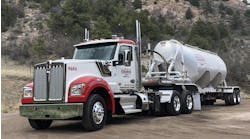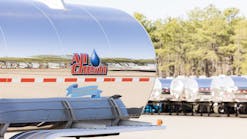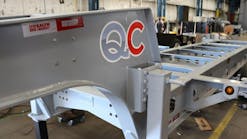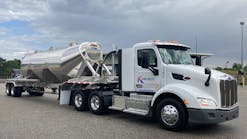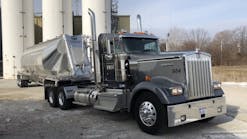Because drivers are willing and able, the operation at Wallis Companies in Cuba, Missouri, moves smoothly — come rain, sleet, or snow, says Jason Wallis, supply and transport director, Wallis Companies.
That kind of driver cooperation is what has enabled the company to thrive, adds Wallis.
Wallis Companies distributes petroleum products under the major brand names of Mobil, Conoco, BP, and Phillips 66 to Wallis-owned convenience stores and more than 150 fuel dealers located throughout eastern, central, and southern Missouri, says Randy Stewart, transportation director.
The company is a wholesale distributor of distillates and industrial and commercial lubricants to the public, industry, government, schools, hospitals, and farmers. In addition, Wallis operates Great River Wash, a car wash distributorship that provides services, equipment, and supplies to car wash operators. Wallis also operates the Hen House family restaurant in Bourbon, Missouri.
But despite its varied and large operations, the company prides itself on its personal touch and family-like atmosphere that encourages employee interaction, says Stewart.
Family operation
Wallis gives credit not only to the drivers, but to all employees for the success of the business established by his father and mother, Bill and Lynn, in 1968. That first year the couple handled 200,000 gallons of fuel with one tractor/tank trailer unit and one bulk truck.
After the death of Bill Wallis in 2001, the family continued to build upon the company's success. Today, Lynn Wallis serves as president and chief executive officer. Her daughter Rachel Andreasson, is vice-president, organizational services. Two other sons, Chad, general manager of the company's car wash division, and Adam, director of wholesale, complete the family lineup.
Since its inception, the company has grown at a steady pace with business generated by long-time customers. A Route 66 service station in Cuba was part of the original acquisition and was operated for several years until it was restored to its original 1930s design and leased for other commercial purposes. In the beginning the company's service stations were in rural areas. By 1993, Wallis Oil had acquired the Mobil assets in St Louis — and still owns and operates most of them today.
“We've really tried to stay in our niche to have petroleum products,” says Wallis. “This allows us to maintain our service to customers.”
As the company has expanded, the leadership in the transport group has developed a program that they believe contributes to employee cooperation. Many of the employees observe their colleagues' duties as part of their training so that they can understand the challenges each face. Drivers spend time in the dispatch office and are given opportunities to transfer to office positions when they become available. All current dispatchers were formerly drivers, Wallis notes.
“Many of our office employees will ride with our drivers to experience the routine,” says Stewart. “That's no matter what the driver's schedule is. Sometimes it may mean starting out at 3 am. We also discovered something we weren't expecting when employees began telling us that their driving skills in their private vehicles have improved as a result of their observations in the truck.”
Driver applicants
Driver applicants must be at least 25 years old. “We look at drivers that have a lot of driving experience, but not necessarily in tanks,” says Stewart. “We would rather hire drivers who have a lot of experience with trucks, and we will train them to haul fuel.”
Training under the direction of Jessica Christiansen, environmental compliance manager, includes company policies, Department of Transportation regulations, and hazardous materials handling. Trainees are familiarized with rural two-lane highways and small-town deliveries. “They learn to watch for that deer in the road,” says Wallis.
Once hired and part of the team, drivers attend quarterly safety meetings. If they meet safe driving criteria, they are eligible for bonuses based on a percentage of quarterly gross revenue. Average driver tenure is eight years and annual retention is close to 90%.
In addition to the driver force, there are others who serve the transportation department with multiple duties, such as dispatching, supervising groups of drivers, supply management, inventory management, and driving. They include Stewart; Kenny Raines, terminal manager; Larry Demidow, transportation maintenance manager; and Randy Walls, Donnie Smith, Brian Peak, Mark Brant, all dispatchers. In addition, all dispatchers maintain commercial driver licenses, which enables them to step into the driver seat if the need occurs.
Drivers are dispatched from the Cuba office and terminals in Cape Girardeau, Pacific, Kansas City, and Joplin. @Road, the program used for vehicle tracking, driver logs, and text messaging, can be accessed by dispatchers at home — in addition to the office — via the Internet. Drivers are issued cell phones for business purposes.
“The efficiency we have achieved overall with the program is definitely an improvement,” says Wallis. He notes that dispatchers keep abreast of winter weather forecasts so customer needs can be anticipated. If the weather threatens to shutdown traffic, Wallis Oil drivers see that storage tanks are filled before the storm arrives. “That is just one more example of the cooperation and versatility of our drivers,” says Stewart. “They are always ready to adjust their schedules as we need them.”
The carrier has implemented the Telapoint Internet software solution to streamline and manage fuel replenishment for customers. Using the browser-based application helps the transport team forecast deliveries.
“Telapoint is helping us to better manage fuel inventories and to optimize the use of our transportation resources,” Wallis notes.
Vehicle fleet
The fleet includes 25 tractors (plus two for owner-operators) and 29 tank trailers. Four-compartment 9,800-gallon aluminum tank trailers typically are supplied by Heil Trailer International and Beall Corp.
“We wanted to standardize our tank trailers,” says Wallis. “Werts Welding and Tank Service really helped us with our specifications. They have been a world of knowledge for us and perform most of our repairs. Standardizing is easier all around. It has become a safety factor because drivers now know exactly how to handle the vehicles.”
Tank trailers are equipped with Civacon components, including overfill protection hardware that is housed in a cabinet to protect it from dust and other road elements. Wallis typically specifies Haldex or MeritorWabco antilock braking systems and Alcoa aluminum disc wheels. A few of the trailers have Michelin X One single tires.
Wallis specifies Kanaflex hoses supplied by Werts. Hose racks are notched back to assist drivers in observing sight glasses. Zone Defense LLC camera systems are mounted at the trailer rear with a display in the tractor cab to give drivers a better view of objects behind the vehicle.
Emphasizing a pristine look for its tank trailers, the company has them polished every three years. The new Heil trailers have received a Nylac finish to aid in the polished look.
For its lubricant operation, Wallis operates nine bulk oil trucks, most of them Kenworth or Peterbilt. Tanks mounted on the chassis are from New Progress LLC and Trans-Tech Industries Inc and are equipped with Liquid Control meters, Civacon air manifold systems, and Hannay electric hose reels. Blackmer pumps are mounted on the trucks.
The tractor fleet includes 17 Peterbilts, five Kenworths, and five Macks. They typically have C-15 Caterpillar engines with 475-horsepower and 10-speed Eaton Fuller transmissions. Two Macks and two Kenworths are equipped with Bendix stability systems designed to protect against rollovers.
Most of the vehicles are parked on the yard at the corporate headquarters when they are not in use. The three-acre area is fenced and gated and is equipped with surveillance cameras.
Outsourced maintenance
The company outsources all of its maintenance, but Demidow coordinates all vehicle repairs. Tank trailer maintenance and repairs are handled by Werts, and tractor maintenance and repairs are provided by truck dealers.
Demidow says that keeping the vehicles in good running order is just one more way to emphasize the importance of employee cooperation and encourage drivers who are doing their best to meet the demands of the market each day.
As the trucking industry continues to face difficulties in driver recruitment and retention, Wallis Oil has developed an operation that stands ready to serve its customers with a willing and able driver force.

